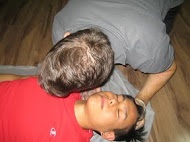
One of the fears that a number of people will have, admittedly, is to be in the presence of someone who is experiencing a seizure and not know what to do about it. It is for this reason that this article highlights the procedure of handling someone who is experiencing a seizure. This is very important especially when you consider that not all seizures will have the patient wrenching out of control. In a good number of cases where patients have experienced seizures, such an individual will tighten their lips, sometimes in a quiver manner, seemingly unaware of happenings in their immediate environment. They will act aloof, stare into space and simply look absent minded, what some people refer to as zoning out.
What do you do in such a scenario? It is recommended that when in the vicinity of someone experiencing a seizure in this way, it is imperative that you let them be because there is very little you can do. You can, however, guide them to safety in case they are moving about to prevent exposing them from danger as is the case when you get rid of electrical cables, hot beverages and sharp objects among many others. The bottom line is that you need not cause a restraint as far as the seizure is concerned. Usually, mo professional medical help is required unless the victim has sustained an injury. The other case in which one should seek professional medical help is when the time period of the seizure elapsed is more than 5 minutes. This means that if you are keen, you ought to be able to effectively time and monitor the seizure.
What about handling a person who is experiencing a seizure that is characterized by jerking and aggressive movements? Such seizures are usually referred to as tonic-clonic seizures, and there are a few steps that you could take to make sure that such episodes are well managed. The first thing that one must remember is that you MUST NOT put anything into the victim’s mouth in a bid to prevent them from biting their tongue. This is a fallacy and actually poses more danger in the form of choking than it does good, so it is best if it is avoided in totality even with less severe tonic-clonic seizures.
A number of concerns have been raised about an individual who is experiencing a seizure and the risk of swallowing their tongue. Contrary to popular belief, this is an impossibility, but there is actually a chance that during the jerking movements, such an individual may have their tongue limp back and cause obstruction of the airways, to prevent this from happening, it is recommended that the assisting individual simply rolls over the victim to lay on their side so that naturally, the tongue slumps forwards as opposed to backwards. As mentioned above, do not try to wake the victim up; instead, allow for the seizure to run its course and attend to the victim when they are back to ‘normal’.
